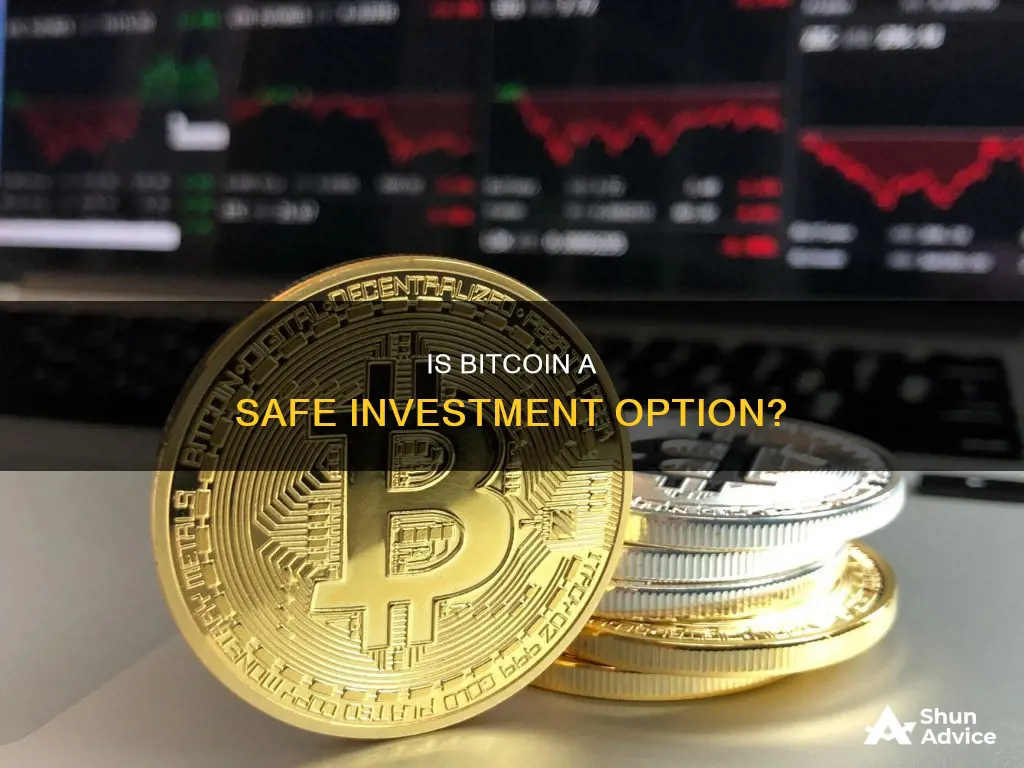
Bitcoin is a risky investment with high volatility, and it is generally recommended that you only invest if you have a high-risk tolerance, are in a strong financial position, and can afford to lose some or all of your investment.
Bitcoin is a decentralised, secure digital currency based on blockchain technology. It is prone to roller-coaster fluctuations in price and, as a new and largely unregulated financial ecosystem, it is susceptible to scams.
If you choose to invest, it is important to maintain a diversified portfolio that includes several different types of investments to reduce your overall risk exposure. As a rule of thumb, don't invest more than 10% of your portfolio in risky assets like Bitcoin.
| Characteristics | Values |
|---|---|
| Volatility | Bitcoin is extremely volatile. Its value can rise or drop by double-digit percentages within hours. |
| Returns | Bitcoin has the potential for high returns. In 2010, it returned 30,203%. |
| Risk | Bitcoin is a risky investment. It has no inherent value and is subject to hype, speculation, and promotion. |
| Security | Bitcoin is secure due to its decentralised nature and blockchain technology. However, it is vulnerable to hacking, scams, and theft. |
| Regulation | Cryptocurrency is less regulated than other asset classes. |
| Taxation | Buying and selling Bitcoin is a taxable transaction. |
| Investment Amount | It is recommended to invest only what you can afford to lose. |
What You'll Learn

Bitcoin's volatility
Bitcoin is considered a volatile investment. Volatility is a measure of how much the price of a financial asset varies over time. The volatility of an asset is important because it indicates how risky it is to hold. The more volatile an asset is, the more its value may go up or down substantially on any given day.
Bitcoin is also volatile because it has no inherent value. It was essentially created out of thin air and is not backed by earnings or profits. It only has value because investors buy it, believing its price will rise in the future. This makes it different from stocks, which are backed by the earnings or profits of a corporation, or bonds, which are backed by the promise of a corporation or government to make payments.
How to Mitigate the Risk
To reduce the risk of investing in Bitcoin, you can:
- Store your Bitcoin securely in a cold wallet (a hardware wallet) or a hot wallet.
- Don't invest more than you can afford to lose.
- Do your research to avoid scams.
Strategies Post-Bitcoin Investment: Steps to Take Now
You may want to see also

Bitcoin's environmental impact
Energy Consumption
Bitcoin mining is highly dependent on fossil fuels, particularly coal and natural gas, which account for 45% and 21% of its energy supply, respectively. This heavy reliance on fossil fuels has led to a significant carbon footprint, with global Bitcoin mining activities consuming 173.42 Terawatt-hours of electricity between 2020 and 2021. This energy consumption is comparable to that of entire countries, and if Bitcoin were a country, it would rank 27th in the world in terms of energy use.
Carbon Emissions
The carbon footprint resulting from Bitcoin mining is substantial. During the 2020-2021 period, Bitcoin mining emitted over 85.89 million metric tons of CO2, which is equivalent to burning 84 billion pounds of coal or operating 190 natural gas-fired power plants. To offset this carbon footprint, 3.9 billion trees would need to be planted, covering an area almost equal to the Netherlands, Switzerland, or Denmark, or 7% of the Amazon rainforest.
Water and Land Use
In addition to its carbon footprint, Bitcoin mining also has significant water and land footprints. During the 2020-2021 period, Bitcoin's water footprint was similar to the amount of water required to fill over 660,000 Olympic-sized swimming pools, enough to meet the domestic water needs of more than 300 million people in rural sub-Saharan Africa. The land footprint of worldwide Bitcoin mining activities during this period was 1.4 times the area of Los Angeles.
Other Environmental Concerns
Bitcoin mining also generates significant amounts of electronic waste (e-waste). The production and disposal of hardware specifically for Bitcoin mining contribute to this issue, and it is estimated that Bitcoin's annual e-waste could surpass 64.4 metric kilotons, adding to the growing global e-waste problem.
Mitigation Strategies
There is a growing recognition of the need for regulatory interventions and technological advancements to address the environmental impacts of Bitcoin and other cryptocurrencies. Some experts advocate for a shift from the energy-intensive "proof-of-work" cryptomining approach to the more energy-efficient "proof-of-stake" mechanism. Additionally, investing in other types of digital currencies that are more efficient in terms of energy use and less harmful to the environment is recommended.
Digital Currency: Best Investment Options
You may want to see also

Bitcoin's regulatory environment
Bitcoins Regulatory Environment
The regulatory environment for Bitcoin is complex and ever-evolving, with varying approaches taken by different countries and regions. Here is an overview of the regulatory landscape in key regions:
United States: In the US, the regulatory environment for Bitcoin involves the Securities and Exchange Commission (SEC), the Commodity Futures Trading Commission (CFTC), and state-level regulations. The SEC regulates securities, including certain cryptocurrencies and initial coin offerings (ICOs), while the CFTC oversees commodities, including Bitcoin futures and derivatives. The Internal Revenue Service (IRS) classifies Bitcoin as property for taxation purposes, and the Department of Financial Protection and Innovation is yet to determine if digital currency transmission falls under California's Money Transmission Act.
Europe: The European Union (EU) generally recognises Bitcoin as a crypto-asset and does not prohibit its use. EU-wide regulations, such as the 5th Anti-Money Laundering Directive (AMLD5), aim to combat terrorism and money laundering by imposing strict Know Your Customer (KYC) and Anti-Money Laundering (AML) requirements on cryptocurrency traders and holders. Individual European countries also have their own rules; for example, France has regulated ICOs and crypto service providers, while Germany has granted Coinbase an official license to operate.
Asia: Asia has a diverse range of regulatory environments, with China taking a restrictive approach by banning Bitcoin trading, mining, and ICOs due to concerns over money laundering and financial stability. In contrast, Japan has embraced Bitcoin, recognising it as a legal form of payment and implementing a licensing system for cryptocurrency exchanges. India's stance on Bitcoin has evolved, initially banning cryptocurrencies in 2018 but lifting the ban in 2020, allowing legal buying, selling, and trading.
Latin America: Latin America has seen a growing acceptance of Bitcoin, with countries like El Salvador, Paraguay, and Panama implementing various forms of regulation or recognition. El Salvador made headlines by becoming the first nation to recognise Bitcoin as legal tender in 2021, while Paraguay has introduced a taxation and regulatory framework for businesses in the cryptocurrency field. Panama has also introduced a bill to enable cryptocurrencies as a form of payment for civil and commercial transactions.
The regulatory landscape for Bitcoin continues to evolve, and it is crucial for users and investors to stay informed about the changing environment. While some countries have implemented strict regulations, others have taken a more progressive approach, reflecting the diverse nature of the digital currency and its impact on the global financial system.
The Ultimate Guide to Buying Bitcoin for Investment
You may want to see also

Bitcoin's security and storage
Bitcoins Security and Storage
Bitcoin is a risky investment with high volatility, and it is generally recommended only if you have a high-risk tolerance, are in a strong financial position, and can afford to lose some or all of your investment. If you choose to invest, it is important to maintain a diversified portfolio that includes several different types of investments to reduce your overall risk exposure. As a rule of thumb, don't invest more than 10% of your portfolio in risky assets like Bitcoin.
Security Concerns
Bitcoin's price volatility is well-known, with gains and losses in the thousands of dollars in short periods. In 2022, the price of BTC dropped from almost $48,000 to lows of around $16,000. This kind of market volatility can make crypto feel unsafe to new investors.
Additionally, crypto scams are becoming more common. A Federal Trade Commission report from June 2022 found that over 46,000 Americans lost more than $1 billion to cryptocurrency fraud between January 2021 and March 2022.
Bitcoin's technology is relatively safe, but it is not anonymous and relies on passwords. While Bitcoin disguises your personal information, the address of your crypto wallet is publicly available, and hackers could potentially use web trackers and cookies to access your private information and data.
Storage Options
There are several storage options for Bitcoin, each with its own advantages and disadvantages.
Cold Wallets: Cold wallets, or offline wallets, are not connected to the internet and are, therefore, less susceptible to hacking. They are considered one of the safest methods for storing Bitcoin. Examples include USB drives, small devices, or simply writing the keys on paper and storing them in a safe. However, cold wallets are still vulnerable to theft, loss, or damage.
Hot Wallets: Hot wallets are connected to the internet and are more convenient for accessing Bitcoin. However, they are more vulnerable to hacking. Examples include desktop, mobile, and web-based wallets.
Custodial Wallets: These wallets are managed by a third party, such as a cryptocurrency exchange. The custodian stores your private keys, guaranteeing their safety and sometimes providing insurance on holdings up to a certain amount. However, custodial wallets have been the target of many attacks.
Non-Custodial Wallets: In this case, you store your keys with no one else involved. These can also be hot or cold wallets.
When choosing a storage option, it is essential to consider the level of security, convenience, and accessibility that best meets your needs. It is recommended to use a combination of hot and cold storage methods, with most assets held in cold storage to balance security and convenience.
Best Practices for Bitcoin Security and Storage
- Use a strong password that includes letters, numbers, and punctuation marks and is at least 16 characters long.
- Regularly back up your entire Bitcoin wallet to protect against computer failures and human errors.
- Keep your software up to date to receive important stability and security fixes.
- Use two-factor authentication for added security.
- Only keep small amounts of Bitcoin on your computer, mobile, or server for everyday use, and store the rest in a safer environment.
- Consider using a multi-signature feature, which requires multiple independent approvals for transactions, adding an extra layer of security.
- Be cautious with online services and third-party apps, as they are susceptible to hacking.
- Always be careful not to lose your private keys or password, as this could result in permanent loss of access to your Bitcoin.
Turkey's Bitcoin Investment Guide: Getting Started
You may want to see also

Bitcoin's investment risks
Bitcoin is a risky investment with high volatility, and it is recommended that investors only consider it if they have a high-risk tolerance, are in a strong financial position, and can afford to lose some or all of their investment. Here are some of the key risks to consider:
Volatility
Bitcoin's price can fluctuate significantly, and investors need to be prepared for big downturns. In 2022, the price of Bitcoin dropped from almost $48,000 to lows around $16,000. There is also the possibility that it could go to zero if several crypto platforms fail and there is a massive sell-off.
No Inherent Value
Bitcoin has no inherent value as it is not backed by earnings, profits, or the promise of a corporation or government. It only has value because investors buy it, believing its price will rise. This makes it different from traditional investments like stocks or bonds, which have underlying assets or cash flows that can be valued.
Regulatory Risk
The regulatory environment for cryptocurrency is uncertain, and it is unclear whether Bitcoin is here to stay in its current form. There is a possibility that governments or central banks could establish their own digital currencies, which could replace Bitcoin and other cryptocurrencies. For example, in 2021, China effectively made it illegal for its citizens to mine or hold any cryptocurrency.
Cybersecurity
As a digital asset, Bitcoin is vulnerable to cyber attacks and theft. While the blockchain technology underlying Bitcoin is secure, investors must keep their passwords and digital keys secure. If an investor loses their password or has their credentials stolen, they could lose access to their Bitcoin permanently.
Transaction Risks
Bitcoin transactions are irreversible, and there are no legal protections like those offered by credit card companies. Once a transaction is made, the only way to get your money back is if the recipient sends it back. Additionally, each sale of Bitcoin can result in a capital gain or loss for U.S. taxpayers, and there are high transaction costs.
Competition
There are thousands of other cryptocurrencies in existence, and new ones are constantly being created. If a developer creates a cryptocurrency that meets the demands of crypto buyers better than Bitcoin, it could reduce support for Bitcoin and cause its price to plummet.
Scam and Fraud Risks
Cryptocurrency crime and scams are on the rise, and investors need to be cautious. The Federal Trade Commission reported that over 46,000 Americans lost over $1 billion to cryptocurrency fraud in 2021.
Should You Invest in Bitcoin Now?
You may want to see also
Frequently asked questions
Bitcoin is a risky investment with high volatility and should be considered only if you have a high-risk tolerance, are in a strong financial position, and can afford to lose some or all of your investment.
It is recommended that you do not invest more than 10% of your portfolio in risky assets like Bitcoin.
The risks of investing in Bitcoin include high volatility, the lack of inherent value, cybersecurity threats, regulatory uncertainty, and competition from other cryptocurrencies.







